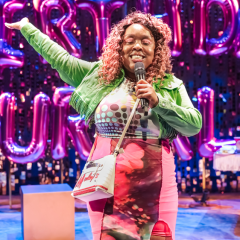In the melting pot that is London, there is no shortage of shows, exhibitions and other such events which focus on exploring cultural history, cultural conflict and the challenges – and benefits – of living in the totally diverse, globalised and multicultural society we have today. In this section of my portfolio, I'm going to be reviewing two musicals and an exhibition, each of which takes a look at a very different aspect of culture and presents its discoveries in a very different way.
The first of these is the musical Bend it Like Beckham. Originally produced as a comedy film in 1997 by British company Redbus Film Distribution (now Lionsgate), it isn't exactly the most highbrow choice of musical and is more of a fun fest of lights, puns and action to watch with family. But as well as having its fair share of "coolness", which my football-obsessed younger brother adored, the musical and the movie on which it was based has several important and relatable cultural messages, and is the kind of musical which would give any progressive in the audience the urge to stand up, pump their fist and yell "YES!" multiple times. The story is quite straightforward – an Indian girl growing up in the UK loves football, her traditionalist, first-generation immigrant parents forbid her from playing and she continues to play after being scouted by a team while hiding this from her family, against the backdrop of her sister's turbulent love life and a love triangle involving her coach and her best friend – but there are enough twists and subplots to keep the plot itself fast-paced and entertaining.
I fell in love with the movie (and, needless to say, its male protagonist) when I first watched it. It had the perfect mix of humour, food for thought, a killer soundtrack and plenty of Indian cultural references. So as something of a musical aficionado, I was beyond excited when I found out that there was to be a musical version of the film, and my expectations were extremely high. Especially because the last two theatrical adaptations of pieces of art which I loved – 1984 and The Curious Incident of the Dog in the Night-Time – had been stellar.
But unfortunately, I have now learnt not to expect so much. This musical was alright, but the film was a thousand times better. The problem wasn't that the plot was not suited to the format of musicals. India has a rich (and very pleasing to the ear, though I may be slightly biased here) tradition of ethnic music, and a clever fusion of traditional and modern Indian music with Western music would have complemented the cultural clash narrated by the film really well. Instead, the music was mainly standard musical fare, all "heartfelt" ballads and showy dance numbers. There's nothing wrong with that, and it works perfectly well with other musicals, but it made this particular musical feel more like a generic love story and less like a story of cultural conundrums. The generic feel of the music also made the musical as a whole less relatable; I never felt completely "in the shoes" of the protagonist, I felt as though I was just watching another musical. Which, again, works in some circumstances – I'm a big fan of episches Theater. However, as an Indian girl who grew up in the UK and has no intention of adhering to cultural customs and gender roles, I expect to be able to relate to stories about other Indian girls who grew up in the UK and have no intention of adhering to cultural customs and gender roles. And the fact that I didn't while watching this means that something went very wrong. As for characterisation, staging and so on, it was all good, but there was nothing special and nothing that I feel inclined to comment on in that regard.
The mediocrity of the musical aside, the story itself is filled with cultural commentary. By this I don't mean some kind of technical anthropological analysis, but something which can often be more illuminating than such analyses: relatable description of a situation which is very real amongst immigrants who have had children in a radically culturally different country and are having to deal with the discomfort of deviation from tradition in their own homes. As a third-generation immigrant (well, de jure I'm second-generation, but my mother came to the UK at a very young age so she was more like a second-generationer) I never really understood the cultural dilemma faced by many first-generation immigrants over whether to stay true to their traditional values or adapt to the more progressive values of their Westernised offspring; for me, the question was a no-brainer because I'd been so culturally Westernised.
But as I now see, for someone who has already had to deal with the absorption of the culture shock which comes with migration and with the arduous task of surpassing cultural boundaries and forgetting much of what they were taught as a child, raising a child from birth in a Western country and therefore having them irrevocably shaped in a Western way must prove stressful. Because when your child is Western, your household can no longer be a haven, a miniature Ahmedabad/Nairobi/Warsaw/wherever in the UK. It too will become foreign to you. Before you know, a foreign tongue will ring through it, foreign films will be watched in it, foreign costume will be worn in it, foreign food and friends and partners will be brought home to it. And this – whether it "should" be or not – is frightening. People have something of a dialectical relationship with change: we crave the new but find comfort in the old. This, arguably, applies more to cultural change than any other sort of change; it's why you may believe in "la vie sans frontières" but still think that "there's no place like home." In today's world, where thousands of people move to another country every year and you can barely turn on the news without hearing a story about immigration, this is more relevant than ever.






0 Comments